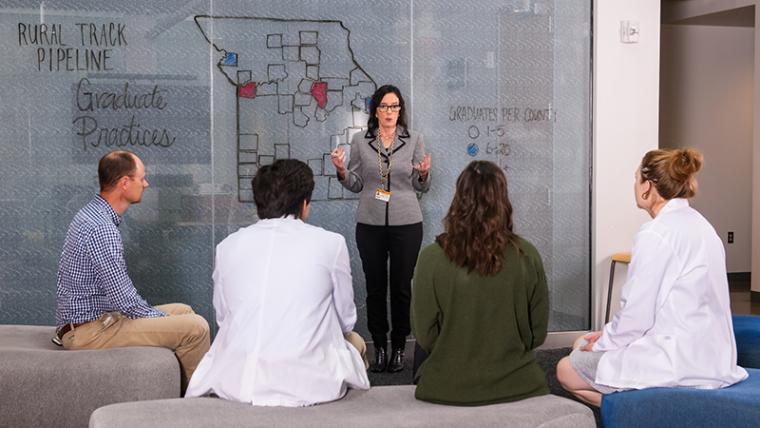COLUMBIA, Mo. – The University of Missouri School of Medicine joins health care organizations across the country to honor the thousands of health care students and professionals serving the unique health needs of an estimated 57 million rural Americans.
Nov. 19 marks the 10th anniversary of National Rural Health Day, an annual observance by the National Organization of State Offices of Rural Health every third Thursday of November. The organization’s mission is to “promote the ‘Power of Rural,’ bringing much needed attention to the ongoing efforts to communicate, educate, collaborate and innovate to improve the health of an estimated 57 million rural Americans.”
The MU School of Medicine received an official proclamation of Missouri’s recognition of National Rural Health Day this year from Gov. Mike Parson.
Rural health care is an essential and immediate need for Missourians. While 37% of Missourians live in rural communities, only 18% of Missouri physicians practice there. As the Baby Boom generation ages and needs more care, the crisis will worsen in rural Missouri, where a greater percentage of the population is over the age of 65.
“More Missouri doctors receive their medical degree from MU than from any other institution, so we feel an urgency and an obligation to address this growing health care crisis in our state year-round,” said Steven Zweig, M.D., dean of the MU School of Medicine. “We already have several unique programs designed to offer our medical students encounters and training in rural and underserved areas.”
The medical school took a step to address the physician shortage with its class expansion project, which included the founding of the Springfield Clinical Campus in 2016. That allowed MU to increase its class sizes from 96 to as many as 128.
Another key initiative is the Rural Track Pipeline Program, which is designed to find and train students to practice medicine in small towns. It recruits students from rural areas through the Bryant Scholars Pre-Admissions Program and gives students clinical experience in rural health care settings during medical school. Of the Rural Track program graduates, 48% practice in rural areas and 32% practice in rural Missouri. For Bryant Scholar graduates, 59% practice in rural areas and 49% practice in rural Missouri.
MU’s Rural Track program, which celebrates its 25th anniversary this year, received grants in 2019 and 2020 totaling nearly $8 million from the U.S. Health Resources and Services Administration. The money is being used to expand the Rural Track Pipeline Program and created a Rural Track residency in Sedalia, Missouri. Funding also supports:
- Summer Community Program, a summer session for second-year medical students that exposes them to different rural medicine opportunities
- Rural Clerkship Program, an opportunity for third-year medical students to complete up to three clerkships at rural hospitals
- Rural Track Elective Program, an opportunity for fourth-year medical students to complete electives in rural, community-based settings
- Medical Simulation Experiences, the Russell D. and Mary B. Shelden Clinical Simulation Center’s mobile simulation vans take the simulation center on the road and will now have top-of-the-line equipment to deliver training and improve the skills of rural learners and providers throughout Missouri
- Health Care Workforce Project, a project that analyzes the characteristics of Missouri's health care workforce by surveying members of health care occupations and professions about characteristics of their professional experience, current jobs and future plans
Investing in rural health education involves established physicians as well as students in training. The Continuing Medical Education and Physician Lifelong Learning programs educate providers on patient-centered care. Through these programs, providers can participate in the Missouri Telehealth Network and Show-Me Echo, initiatives that create a collaborative network of shared medical knowledge. Show-Me Echo has educated 4,486 professionals from 108 of the 114 counties in Missouri about a range of topics, including autism, opioids and COVID-19.
MU’s rural health expertise has not gone unnoticed. The Rural Medical Educator group of the National Rural Health Association released “Profiles of Rural Medical Educators” in 2020. The e-book compiles conversations with experts from across the nation on reversing rural physician shortages and Kathleen Quinn, Ph.D., associate dean for rural health at the medical school, was invited to participate in the project.
Quinn has led the medical school’s rural health programs for almost 20 years and earlier this year was named senior program director for community health engagement and outreach for the University of Missouri. This joint position between the medical school and the University of Missouri Office of Extension and Engagement is a collaborative role that demonstrates MU’s integrated approach to community health and its commitment as a land-grant institution to improve the health and well-being of all Missourians.
Quinn is using her relationships across the state to help close the health care gap by prioritizing approaches that will bring new technology and expertise to rural communities, a key aim of the UM System’s NextGen Precision Health initiative. UM System researchers, clinicians and MU Extension community specialists are addressing health care disparities from multiple angles.
“NextGen is not just a building in Columbia,” Quinn said. “This is research, this is partnerships, this is collaboration between the university and communities working together to solve real challenges rural Missourians face.”
About the MU School of Medicine
The MU School of Medicine has improved health, education and research in Missouri and beyond for more than 170 years. MU physicians treat patients from every county in the state, and more Missouri physicians received their medical degrees from MU than from any other university. For more information, visit http://medicine.missouri.edu/.
Story contact: Hannah Hirabayashi, musickh@health.missouri.edu, 573-882-4173
